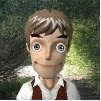So...back to Yes.
Yes became the whipping boys for everyone who hated progressive rock. My guess is that's because they a) took themselves very seriously, and b) insisted on making each successive album bigger and more grandiose, and finally c) their music had nothing whatsoever to do with the blues. Happened to Emerson, Lake and Palmer too, but the knives were out for ELP from the beginning.
Yes' "Fragile" album was probably the last release that saw them straddling the line between fan expectations and critical approval, though the fact that "Fragile" also featured each band member's solo turn gave some listeners pause. "Close to the Edge" featured only 3 songs, one being the side-long title track, and now the accolades were coming exclusively from the prog fans (though Rolling Stone gave it the feature spot in the reviews page.) Side Two's "Siberian Khatru" is one of my favorite songs ever, but Jon Anderson's lyrics? I still have no idea what they mean. David Bowie borrowed William Burroughs' random cut-up method of assembling lyrics, yet he's considered a genius? Jon Anderson, you deserve another look.
Then the final straw....
"Tales from Topographic Oceans", 4 sides, 4 songs, based on footnotes in "Autobiography of a Yogi" about Shastric scriptures. Or something. (What can I say? It was 1973/1974.) It's not really terrible, but it could have been edited to a single LP without much trouble. I wonder if halfway through they didn't wonder "Why are we doing this again? Oh yeah, we're Yes. How can we top Jethro Tull's "Thick as A Brick" which is just one song over 2 sides?"
You could say they were asking for it, and from here on in, "Tales" became critical shorthand for the bloated dinosaur product soon to face the gobbing face of punk.
But other bands carried the progressive banner in a much lower key under-the-radar way. The sudden advent of punk only confused the prog set. "I don't get it; we're instrumentally adept, writing interesting and complicated adult material, only to be trumped by bands that are challenged to pull off something like "Louie, Louie". What's up?" Keyboardist Dave Stewart's notes in the National Health reissue are brutally humorous as he describes sinking lower and lower on the foodchain until he's reduced to making a living by transcribing 'songs' by Slaughter and the Dogs for the record company's publishing arm.
An earlier incarnation of National Health, Hatfield and the North, drew members from Caravan and other members of the Canterbury scene, which spawned Soft Machine and eventually the fine catalog of Robert Wyatt, among others (and I'm a big, big fan of them all.) Dryly humorous and somewhat pastorally English in atmosphere, these and other bands managed to pursue their progressive agenda backed by fan support and, if not with critical acclaim, at least under a critical truce. Prog would live to fight another day.
The '90s saw a blossoming of the progs, some under the mantle of "math rock". Isn't that the best? A new breed of musician, facing an uncertain future armed with pocket protectors.
More on Caravan, Hatfield, National Health and Robert Wyatt later this fall.














